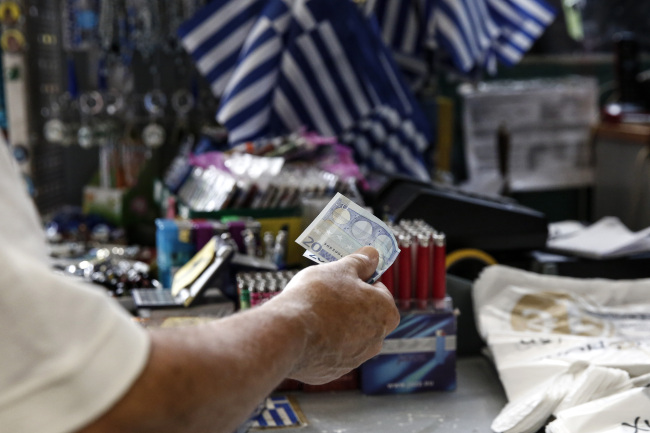The bailout of Greece cleared some further key hurdles Friday after German lawmakers overwhelmingly gave their backing to another financial rescue and the European Union said it would release an interim loan that will ensure Athens avoids an imminent debt default.
The developments, along with Greek parliamentary approval early Thursday of creditor-demanded austerity measures, prompted a positive assessment from Europe's bailout fund, which approved a “decision to grant, in principle, stability support to Greece in the form of a loan program.”
The developments, along with Greek parliamentary approval early Thursday of creditor-demanded austerity measures, prompted a positive assessment from Europe's bailout fund, which approved a “decision to grant, in principle, stability support to Greece in the form of a loan program.”

Prime Minister Alexis Tsipras, meanwhile, made changes to his government after he faced a rebellion in his party's ranks over the austerity measures, replacing two ministers who voted against him and changing another eight ministers or deputy ministers.
Though the broad outlines of the Greek bailout were agreed Monday by the eurozone's 19 leaders, the decision by the bailout fund known as the European Stability Mechanism formally kick-starts the process by which Greece negotiates the details.
The discussions, which are expected to last four weeks, will include economic targets and reforms deemed necessary in return for an anticipated 85 billion euros ($93 billion) over three years.
“This agreement offers a chance to put the Greek economy back on track,” said Jeroen Dijsselbloem, the eurozone's top official who also chairs the ESM board. ``It's not going to be easy. We are certain to encounter problems in the years to come. But I believe we will be able to resolve them.”
In recent weeks, the Greek economy has suffered a number of shocks as the country's euro future was on the line. The hope now is that the banks, which have been shut for the past three weeks, will reopen soon and that the paltry 60-euros a day withdrawal limit at ATMs will be raised.
The first big development Friday was the news that German lawmakers, in the wake of their Austrian counterparts, voted 439-119 in favor of opening detailed discussions on the bailout package. Chancellor Angela Merkel had warned them Greece would face chaos without a deal.
That was later followed by confirmation that the 28-country EU will release a loan of 7.16 billion ($7.7 billion) in short-term cash by Monday, when it has a 4.2 billion-euro debt repayment due to the European Central Bank.
The funds, which will come from a long-dormant EU program called the European Financial Stabilization Mechanism, will also help Greece clear arrears with the International Monetary Fund, and with the Bank of Greece.
The loan will be for three months and disbursed over two instalments, and comes a day after the ECB raised emergency liquidity assistance to Greek banks.
“What we're witnessing is European solidarity in action,” said Valdis Dombrovskis, the EU Commission's vice president for the euro.
“Politicians across 27 countries have invested their own political capital to speed through national decisions to shoulder Greece at this difficult time for the country,” he added.
Germany is likely to continue playing a key role in Greece's future as it is the largest single bailout contributor. It's taken a hard line, insisting on stringent spending cuts, tax hikes and wide-ranging economic reforms in return.
“The principle ... of responsibility and solidarity that has guided us since the beginning of the European debt crisis marks the entire result from Monday,” Merkel told the special session of Parliament. The alternative to an agreement, she added, ``would not be a time-out from the euro that would be orderly ... but predictable chaos.”
Merkel will have to return to Parliament to seek approval for the final deal when the negotiations are concluded.
“I know that many have doubts and concerns about whether this road will be successful, about whether Greece will have the strength to take it in the long term, and no one can brush aside these concerns,” she said. ``But I am firmly convinced of one thing: we would be grossly negligent, even irresponsible, if we did not at least try.”
Bailing out Greece hasn't been popular in Merkel's conservative bloc and 60 of its lawmakers failed to back her Friday, with another five abstaining. (AFP)










![[Kim Seong-kon] Democracy and the future of South Korea](http://res.heraldm.com/phpwas/restmb_idxmake.php?idx=644&simg=/content/image/2024/04/16/20240416050802_0.jpg&u=)





![[KH Explains] Hyundai's full hybrid edge to pay off in slow EV transition](http://res.heraldm.com/phpwas/restmb_idxmake.php?idx=652&simg=/content/image/2024/04/18/20240418050645_0.jpg&u=20240418155304)

![[Today’s K-pop] Zico drops snippet of collaboration with Jennie](http://res.heraldm.com/phpwas/restmb_idxmake.php?idx=642&simg=/content/image/2024/04/18/20240418050702_0.jpg&u=)